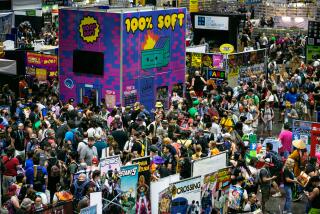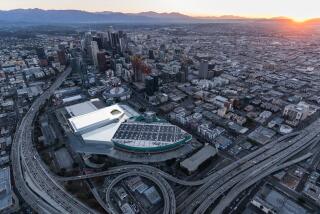Former Foe Stevens Now Convention Center Ally
- Share via
City Councilman George Stevens has cast his lot with the tourist industry three years after a bitter dispute over the renaming of the San Diego Convention Center led him to call for a national boycott of the building.
The debate over whether to rename the center after the Rev. Martin Luther King Jr. raged in February, 1989, at times degenerating into racial name-calling. The San Diego City Council voted to rename the convention center, but the Board of Port Commissioners opted not to, by a 4-3 vote. The San Diego Unified Port District leases the center to the city and had a say in the naming. Two years earlier, voters had rejected a measure to rename Market Street after the slain civil rights leader.
Stevens, who was not on the City Council in 1989, launched a boycott of the Convention Center with other community leaders. On Wednesday, he surrendered.
“It is time to forget those things that are behind us and to press toward the prize that is before us,” he said, announcing that he planned to address the National Urban League July 26 at the Convention Center.
Stevens said a lot has changed since he first waged his “Tell a Friend” campaign in 1989. For starters, a port commissioner is African-American, Stevens noted.
And Dr. Martin Luther King Jr. has been honored in other ways in San Diego, Stevens said.
“We also have a promenade now, and we’ve named the freeway after Dr. Martin Luther King,” Stevens said, referring to the King Promenade--a landscaped strip along Harbor Drive between G Street and 6th Avenue that the city named after King in February, 1991--and a section of California 94 also named after King.
But his reversal doesn’t mean he is satisfied. The minority community should continue to push to honor King, he said, but the Convention Center should not have to suffer.
Stevens said the interests of African-Americans now are better served by the jobs the Convention Center can bring to the city. As manufacturing jobs and the city’s military economy shrink, tourism is becoming a more essential source of revenue.
“As a (council) representative I have accepted a responsibility to attract tourists and conventions” to town, to enhance the city’s revenue and help create jobs, Stevens said.
“I really want to make San Diego the No. 1 convention place in the United States, because it has so much employment connected with it. I want tourism coming into my district.”
It’s unclear what effect the boycott ever had on the Convention Center or the San Diego economy.
When he launched the boycott, Stevens said he contacted radio talk shows in Philadelphia, Cleveland, Detroit and Chicago about it. And, in 1989, Stevens called the National Urban League, asking them to pull out of this year’s commitment.
But a National Urban League spokeswoman in New York said the organization would not boycott a city over the naming of a building. It did, however, boycott Arizona after the state refused to designate King’s birthday a paid state holiday, she said.
“There were people who pulled out,” Stevens said, including an African-American sorority, and Unitarian and Baptist conventions. Stevens is back in contact with those same groups, but his tune has changed.
“I’m working directly with them now to bring national conventions to San Diego,” he said. Stevens is also working with the Convention & Visitors’ Bureau, and recently flew to Washington, D.C., as their guest, he said.
Convention Center spokeswoman Donna Alm said she’s not aware of any financial effect the boycott ever had on the center.
“Actually, we don’t know of any event that was canceled over the boycott but it hurt us to know that there was a councilman upset over it. We’re glad to hear that he is putting closure to this.
The Convention Center, now in its third year of operation, has “exceeded everybody’s expectations,” Alm added, drawing more than 40 conventions and trade shows and 25 consumer shows a year.
Since Stevens came to office in December, 1991, he has cultivated a strong relationship with the center, Alm said, meeting with officials and visiting the center to get a sense of the business it lures. In a press release Stevens issued Wednesday, however, he insisted that he “never set foot in the Convention Center.”
Although Stevens may be willing to let the old dispute die, not everyone in the African-American community in San Diego agrees.
“Personally, I don’t feel that we should let San Diego get off the hook,” said Joshua Von Wolfolk, who helped organize the boycott. “We still should push to put the pressure on the city to respond to minority communities. Every other city in this country has made some kind of substantial tribute to Rev. King.”
Appointing African-Americans to positions Von Wolfolk said are not “policy-making positions” is not an adequate solution, he said.
More to Read
Sign up for Essential California
The most important California stories and recommendations in your inbox every morning.
You may occasionally receive promotional content from the Los Angeles Times.














